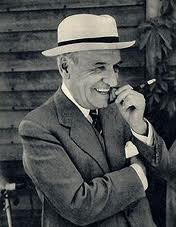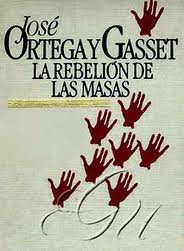Life & works of Jose Ortega y Gasset
José Ortega y Gasset was a Spanish philosopher and essayist, the main figure of the Generation of '14 and Noucentisme movement, and a man of prestige across the world. He's also the leading exponent of the theory of perspectivism and the vital and historical reason.
Ortega y Gasset - Life and Works

Ortega y Gasset was born in a wealthy family in Madrid in 1883. Between 1891 and 1897 he studied in the Jesuit school of San Estanislao de Kostka, in Malaga. His grandfather, Eduardo Gasset y Artimer, had founded the newspaper "El Imparcial", which Ortega's father, José Ortega Munilla, would direct.
Ortega y Gasset was raised up in an educated setting, strongly linked to journalism and politics. In 1897 and 1898 he studies in the Deusto University in Bilbao, and from 1898 to 1904 in the University of Madrid, in the Arts Faculty. In 1904 he obtains his PhD with his essay "Los terrores del año mil. Crítica de una leyenda", and between 1905 and 1907 he studied in Germany, especially in Marburg, where he was strongly influenced by the Neo-Kantianism ideas of Hermann Cohen and Paul Natorp.
Back in Spain, in 1909 he's named tenured professor of Psychology, Logics and Ethics in the Escuela Superior de Magisterio de Madrid, and in October of 1910 he wins the Chair of Metaphysics in the University of Madrid. He marries Rosa Spottorno and has two children with her: Soledad, born in 1914, and José, born two years later.

His public activity from 1911 onwards is unstoppable. He tried to put his Regenerationism ideas into practice, and in 1914 founds the "Liga de Educación Política Española"; in 1915 the magazine "España", and in 1916 he co-founds the newspaper "Sol". At the same time he publishes his first works, like "Meditaciones sobre el Quijote" (1914), "El Espectador" (1916). This started the perspectivist period in his philosophy, which would last until 1923.
Ortega y Gasset contributed to the newspaper "Sol" from 1917. There he publishes, in feuilletons, two of his most important works: "España invertebrada" and "La rebelión de las masas". In 1923 he founds the "Revista de Occidente", of which he was director until 1926. From this publication, Ortega y Gasset promoted the translation and commentary of the most important philosophic and scientific tendencies, like those of Oswald Spengler, Johan Huizinga, Edmund Husserl, Georg Simmel amd Jakob von Uexküll among others.
1923 is marked as the year the dictatorship of Primo de Rivera began. That year, Ortega y Gasset founded "Revista de Occidente", with a strong anti-dictatorship position, which would make him give up his Chair in the University of Madrid in 1929. Instead, he continued his philosophical activities in other places, like the Rex cinema or the Theatre Infanta Beatriz (now called Teatriz), where he gave conference-style classes. This period corresponds with his Raciovitalismo period.

When the Spanish Civil War began in 1936, Ortega y Gasset was ill and at home, and three days after the beginning of the war, several communists arrived his house with guns, demanding that he sign the manifesto against the coup d'etat and in favor of the Republican Government. Ortega denied them entrance, and his daughter convinced the communists to write a shorter text, less politicized, which Ortega ended up signing, together with Gregorio Marañón, Ramón Pérez de Ayala and other intellectuals.
On July of that same year, he leaves Spain in spite of his illness and thanks to the help he receives from his brother Eduardo. He exiles himself in Paris and later in the Netherlands and Argentina, and in 1942 he established himself in Lisbon. In 1945 he returned to Spain, but, seeing he didn't get his Chair in the University back, he founded the "Instituto de Humanidades", a Spanish school in Madrid where he gave classes. During this years and until his death in 1955, Ortega y Gasset's prestige was more recognized outside of Spain (especially in Germany), where he received the credit and opportunities he deserved for a man of his status and prestige.
Ortega y Gasset's philosophical ideas can be divided in three periods:
- Objetivist period (1902-1914): influenced by the German Neo-Kantism and by Husserl's Phenomenology, he even affirms the primacy of objects and ideas over people.
- Perspectival period (1914-1923): begins with "Meditaciones del Quijote". During this period, Ortega describes the situiation in Spain in "España invertebrada" (1921).
- Raciovitalista period (1924-1955): this period begins with Ortega's maturity, with works like "El tema de nuestro tiempo" or "La rebelión de las masas".
Ortega y Gasset is famous for his phase "Yo soy yo y mi circunstancias" (I am I and my circumstances). Ortega insists that absolutely everything that surrounds men (physical, historical and spiritual circumstances) affects them. The surrounding reality "forms the other half of a person", and the impression of our surrounding circumstances is the radical and particular destiny of each person.

